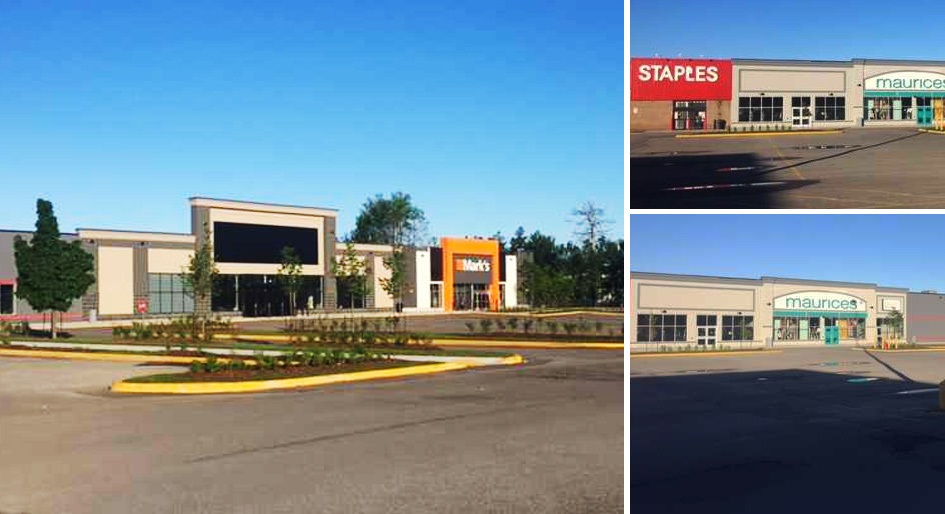Mounds of mangled grocery carts piled in the parking lot of Mountainview Mall a few summers ago. Inside, the smell of burgers and fries wafted from the remaining vendor at the tiny food court. A handful of stores were open. Barely any people were walking through the murky hallway that once led to a giant Zellers. The enclosed shopping centre in Midland, Ontario, a town and popular vacation destination in southern Georgian Bay, was left struggling like many declining malls across Canada.
Either the mall was going to close completely or evolve into something else. Plaza Retail REIT saw an opportunity beyond the tired tiles and outdated flooring and bought the aging asset in 2015, with plans to cut the space down and transform it into a mixed-use strip plaza. The New Brunswick-based retail owner and developer already owns several Shoppers Drug Marts and has constructed new builds in the province, but this is the company’s first mall redevelopment in Ontario.
“It was an amazing property, with so much potential,” says Jamie Petrie, executive vice-president and chief operating officer of Plaza. “We’ve been seeing a lot of demand so far and we’re really pleased with the market.”
Stripping Down and Trading Up
The total investment in Mountainview Mall is $9 million so far. Construction started last year, after the interior tenants were relocated. Some moved elsewhere; others, like Sport Chek, moved to the front of the mall and are now seeing much success in brand new spaces. The entire mall interior will be closed off by the end of summer, once the final tenants, H&R Block and The Source, move out and into a new pad building in what was once the desert of a parking lot.
“One thing we’ve noticed in the redevelopment of regional shopping malls is many of them have really large parking fields that are underutilized,” says Petrie. “Moving from an enclosed centre of 331,000 square feet of pre-redevelopment to what is now 173,000 square feet, means not as many parking spots are needed, leaving more opportunities for pad or separated buildings.”
Renovating the mall and beautifying it with new entrances, sidewalks, curbs and landscaping has also attracted interest in the back of the property. So far, professional services, colleges, a school board, gym and groups looking for storage space have all pursued the idea of relocating offices to the rear.
Additions to the former Zellers space include Mark’s Work Warehouse, which relocated from another part of town. According to Wes Crown, director of planning and building services for Midland, Winners is also a confirmed tenant, set to open by the new year. The site plan also shows room for another pad building, expected to house a “well-loved,” full-service restaurant.
Small Markets. Big Changes
Over the years, smaller markets have struggled to sustain these enclosed shopping centres. A big factor for Petrie is the loss of Canadian anchors like Zellers and now Sears, which “kept things going.” Demographics also ties into this decline.
“Fashion was the lifeblood of these centres,” he notes. “A lot of young people who used to frequent enclosed centres, particularly for fashion, are no longer there in great numbers as they once were, and the aging population of baby boomers may not shop in the same type of retail mix.”
Beyond demographics is a “major shake-up in the fashion industry.”
“A lot of old Canadian retailers cannot seem to compete against new offerings from Europe, the U.S. and in Canada as well,” he says. “Fashion seems to be moving to the discount style like a Winners or H&M, where it’s more treasure fashion that you dig through for a great deal. Then there is Lulu Lemon, Mark’s Work Wearhouse and Sport Chek – fashion that has become part of what we wear every day, certainly among youth.”
Layer on expenses, such as maintenance, and these types of buildings become even more expensive to sustain. Between painting, flooring and tiles, common areas are often hefty spaces to heat, cool and illuminate. Strip plazas have fewer common areas, making them more feasible to maintain.
Transportation infrastructure is another game-changer. Added laneways and more accessible routes are putting pressure on shopping malls in smaller markets, causing them to lose customers to larger, regional centres just down the highway.
“Shopping habits have also changed due to lifestyle,” says Petrie. “There’s less time to do everything you need to do, which is why there are so many restaurants. The growth of restaurants in the retail sector is astronomical because more and more people are relying on fast food or sit down restaurants to feed their family.
“Similarly, strip plazas meet that lifestyle change quite well,” he adds. “Now, you can park right in front of a strip plaza, run in, get what you need and leave.”
Plaza is looking forward to doing a lot more work in Ontario. In a joint purchase, the company acquired Mountainview Mall alongside an enclosed mall in Kenora, Ontario, from the same owner. Since then, Plaza has partnered with RioCan to complete a mall simplification in Cornwall and New Liskeard, also in Ontario and also smaller markets like Midland.
Public reaction in Midland, a town of more than 16,000 people and growing, has been generally positive so far. Petrie calls it a “major part of the community,” and a lot of people are interested in its fate and happy to see a company investing millions of dollars in its future.
“It’s great for employment, investment, property taxes and the energy that comes from a vibrant, new property,” Petrie adds. “The community does lose an interior, public space, but now they’ll have a much more vibrant centre.”
Rebecca Melnyk is online editor of Canadian Property Management @rebeccachirp







